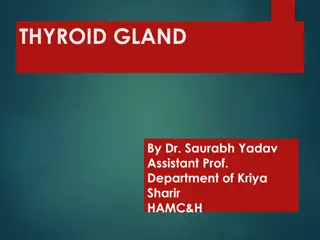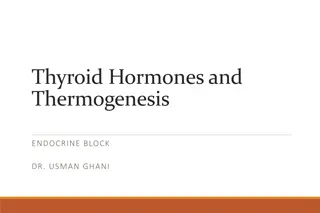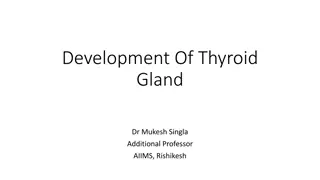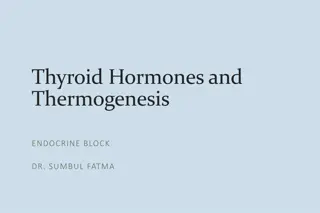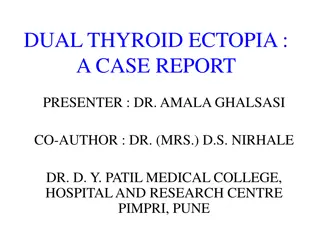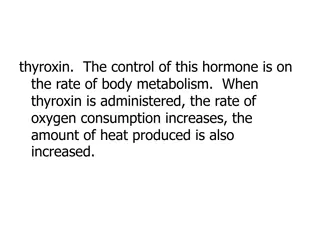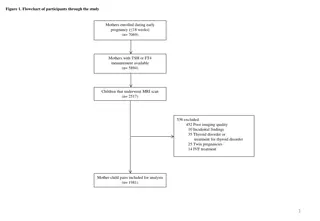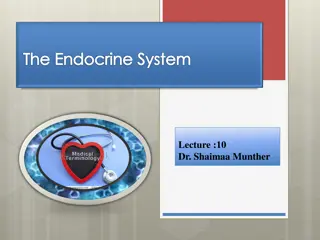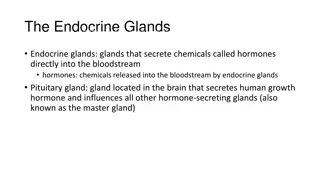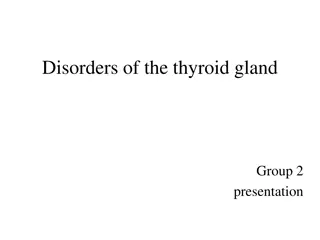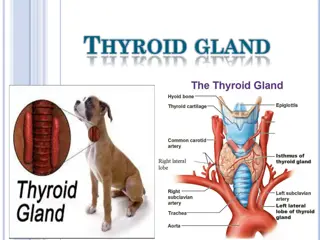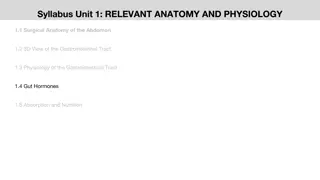Understanding Thyroid Hormones and Their Role in Metabolism
Thyroid hormones, including triiodothyronine (T3) and thyroxine (T4), are essential for regulating metabolism, growth, development, body temperature, and heart rate. They are tyrosine-based hormones produced by the thyroid gland, requiring iodine for synthesis. T3 affects various physiological processes, while T4 helps control oxidation rates in cells. The biosynthesis of thyroid hormones involves the amino acid tyrosine and occurs primarily in the thyroid gland's follicles. Understanding these hormones is crucial for managing thyroid disorders and maintaining overall health.
Download Presentation

Please find below an Image/Link to download the presentation.
The content on the website is provided AS IS for your information and personal use only. It may not be sold, licensed, or shared on other websites without obtaining consent from the author. Download presentation by click this link. If you encounter any issues during the download, it is possible that the publisher has removed the file from their server.
E N D
Presentation Transcript
ENDOCRINOLOGY THYROID HORMONE 3rdYEAR BSc BIOCHEMISTRY SUBJECT CODE-16SMBEBC2 ENDOCRINOLOGY (UNIT-1) VI SEMESTER BY Dr.R.MOHANAMBAL DEPT. OF BIOCHEMISTRY GOVT. ARTS & SCIENCE COLLEGE (W) ORATHANADU.
Definition A chemical substance made by the thyroid gland for export into the bloodstream. The thyroid gland needs iodine to make thyroid hormones. Two hormones produced and released by thyroid gland , namely triiodothyronine and thyroxine.
They are tyrosine based hormones that are primarily responsible for regulation of metabolism. T3 and T4 are partially composed of iodine.
Classification Thyroid gland produces two hormones: 1. Triiodothyronine (T3) 2. Tetraiodothyronine (T4 ) also called thyroxine.
T3 It affects almost every physiological process in the body, including growth and development , metabolism, body temperature and heart rate.
Thyroxin Hormone produced by the thyroid glands to regulate metabolism by controlling the rate of oxidation in cells. L 3,5,5 - tetraiodothyronine increases the rate of chemical reactions in cells and helps control growth and development. It can also be made in the laboratory and is used to treat thyroid disorders.
Biosynthesis of Thyroid hormone Thyroid hormones are amine hormones and so their synthesis is based on the amino acid tyrosine. The primary synthesis organ of Thyroid hormones is the thyroid gland which produces about twenty times more than T4 compared to T3 .
The thyroid gland is full of thyroid follicles which are the basic units of thyroid hormone synthesis. Synthesis of thyroid hormones is a complex multi step process .
It involves five steps : 1) Iodide transport. 2) Thyroglobulin Synthesis . 3) Thyroid Peroxidase 4)Endocytosis of Peroxidase-processed Thyroglobulin. 5) Release of T4 and T3 from Thyroglobulin.
Mechanism of action of Thyroid hormone : Thyroid hormone enters cell through membrane transportor protein . The hormone binds its receptor to form hormone receptor complex in sequences of DNA. The effect of the hormone receptor complex binding to DNA is to modulate gene expression.
Physiological effects of Thyroid Hormones Thyroid hormones have profound effects on many big time physiologic processes,such as 1)Development 2)Growth 3)Metabolism a. Lipid metabolism b. Carbohydrate metabolism
Deficiency of Thyroid hormone. a) Hypo thyrodism Cretinism, Myxedema and goiter. b) Hyper thyrodism Graves disease.




